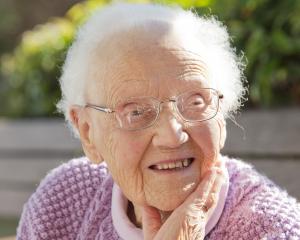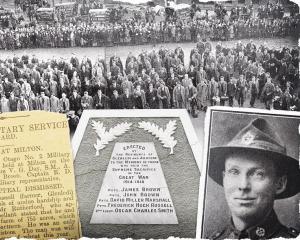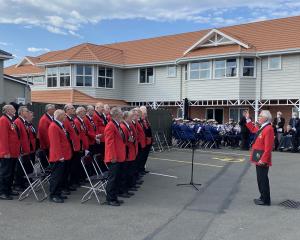Montecillo chief executive Fred Daniel said the national flag was presented to the home in 2006 by HMNZS Toroa on the occasion of last Anzac Day ceremony at the home's former premises in Eglinton Rd, Mornington.
The flag would be used at future ceremonies to acknowledge the ongoing relationship between the home and the armed services, he said.
The Rev Tony Martin, former 4th Otago Southland and British Army chaplain, delivered the Anzac address.
Dr Martin described bravery exhibited and human cost incurred by New Zealand troops during major campaigns of the 20th century, such as Passchendaele, El Alamein and Cassino.
Dr Martin said Anzac Day ceremonies were even more poignant now, as they marked not only the past sacrifice of New Zealand troops but acknowledged the ongoing contribution the armed services made in areas such as Afghanistan.
Montecillo nursing manager Beverly Brook read Gallipoli Poem, written in 1916 by W.S Pakenham-Walsh.
Dunedin man Thomas Carey (85) had attended most Anzac Day events since serving in World War 2.
Mr Carey was a member of a unit which was the precursor to the modern Special Air Services and operated behind German lines in France in 1944.
As a trained surveyor, he could provide accurate strategic information on land suitable for large-scale troop landings. He also served in the Balkans and Italy.
He emigrated to New Zealand from England in the mid-1950s, and worked as a Ministry of Works draftsman.
Representatives from the United Kingdom and Australian High Commissions also attended the ceremony.
The Last Post and reveille were played by a member of the Kaikorai Metropolitan Brass Band.
The Montecillo Veterans Home and Hospital opened (in Mornington) in 1918.
- Nearly 600 people visited the Otago Settlers Museum early yesterday to view a recently developed roll of honour, commemorating all Dunedin people who died at war last century.
The museum opened at 7am on Anzac Day for the second year in a row and 586 people attended the exhibition, between then and the usual museum opening time of 10am, museum visitor programmes co-ordinator John Ingram said.












